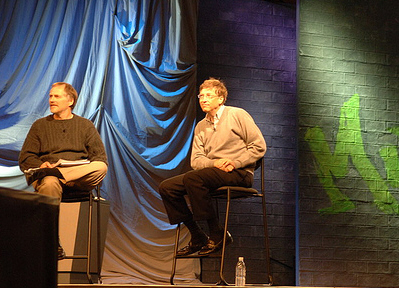Mix '06: Gates ready to embrace and extend

Bill Gates keynoted at Mix '06, outlining Microsoft's evolving Web development strategy and explaining his embrace and extend business philosophy, especially as it applies to Google.
Gates' most covered statement of the morning was, "Everything we do now, we have to be user-centric, not device-centric." Microsoft has been talking about being user centric for decades. Does that mean not Windows centric? Not exactly, but Microsoft has realized that delivering information in optimized forms on every kind of wired or wireless device, anytime, anywhere, is the new center of software gravity. Internet Explorer will languish no more (he offered a mea culpa) and AJAX, RSS and the mashup culture are integral to the Windows development platform and for attracting developers, which has always been one of Microsoft's core strategies.
After his keynote, Web 2.0 evangelist and book publisher Tim O'Reilly interviewed Gates (a Webcast of his keynote and O'Reilly's interview is here). O'Reilly asked Gates about the Internet as a platform for lightweight development with RSS and mashups. "The very spirit of Microsoft going back to the original days of BASIC were about sitting down, writing a very simple program, and getting something going, and making it so as you scale that up into a more complex system, such as customer transactions, you can have richer techniques....Experimentation and excitement will often be there, where you let people very quickly get something done," Gates said.
Gates also talked about how Microsoft would play in the more loosely coupled Internet development (Live applications in Microsoft parlance) world, compared to the Windows-centric world of yesteryear. "For a lot of people, the simplicity hopefully of what we can do in terms of the pieces we do and how they connect them together, that will be "a" choice for how you build state of the art applications."
O'Reilly then asked Gates about the extent to which Microsoft tools would favor Microsoft sites. "You need total flexibility because you are addressing all the different levels of the stack, all the interoperability standards--XML, SOAP, Web services--all of those things are out there free for people to use, even the recent stuff the Ray [Ozzie] did, simple sharing extensions and live clipboard." Free, but not all without patents, which despite royalty-free covenants doesn't make everyone happy.

Tim O'Reilly and Bill Gates Photo: jengates
Gates also endorsed microformats, such as standard schema for calendar events, directions, contacts. "We need microformats that people agree on to bootstrap...it's all very market driven," he said. Hopefully Gates and company will make good on that promise, and work with whole Web community to make it happen.
O'Reilly also asked Gates about social software. He described how the Windows ecosystem delivered a kind of network effect, which was the business model that created Microsoft. He went on to talk about add-ons to Microsoft desktop and Live products, and getting automated feedback on software usage. O'Reilly dubbed that 1.0, and asked Gates about anti-phishing in IE 7 that harnesses collective intelligence to establish Web site, Active Control and download reputations as well as Outlook, which O'Reilly said has "enormous potential to blow away the crude offerings of social networking sites...Outlook is a reflection of their real social life."
Gates responded, "We are not turning Outlook into Myspace, but this idea of your contacts, who you communicate with...there is a lot of rich data that Outlook sees that could help you with your communications...we could go a lot further with the idea of a communication network."
O'Reilly asked Gates about Microsoft's penchant for knocking competitors out of the ring. Google, Yahoo, eBay and others have playing in a different ring, with a different business model--ad supported, free software services. Also, Apple pulling hardware through its iTunes business. "Microsoft has done more to bring software prices down than any other company. The idea of having a way of getting very high volume at very low price has been key to all of what we have done," Gates said. He noted that Microsoft has always have competitors who offer free software, but the integration, support, security and other elements are differentiators.
O'Reilly mentioned cutting off Netscape's air supply when IE was bundled with Windows, and Gates said quipped, "There's a lot of these so-called fights where the other guy really knocked themselves out."
Then Gates came clean about his new competition. "You always have smarter and better competitors. The advertising model came along, and we underestimated how big that would be...so let's embrace what's been done well and go beyond that." And has been Microsoft great strength over the years--to embrace and extend.
In response to an audience question from Anil Dash of Six Apart about what Microsoft is doing to help with business models for those who compete and/or collaborate with Microsoft. "It's certainly our responsibility is to make sure that the software industry thrives....creating new opportunities for software companies is key to us," Gates said. That's always been true, as long as Microsoft doesn't want to take advantage of the opportunities populated by third parties. Even then, Microsoft doesn't always vanquish its competitors. Intuit continues to do well against Microsoft Money, but those selling personal security products are under stress.
He added that many companies in the Windows, and now Live, ecosystems have overlapped with what Microsoft does, and it wants to arm them the best development tools, and more APIs. "If you can beat the things we do, more power to you. That's really fantastic," Gates said, the software warrior.
He then mentioned efforts in the ad market, where he said Google is out in front, as if to affirm with the crowd his intention to embrace and extend what Google pioneered with AdSense. Gates and his team are gearing up to get in the ring with Google and other companies born of the Web. The fur will fly...